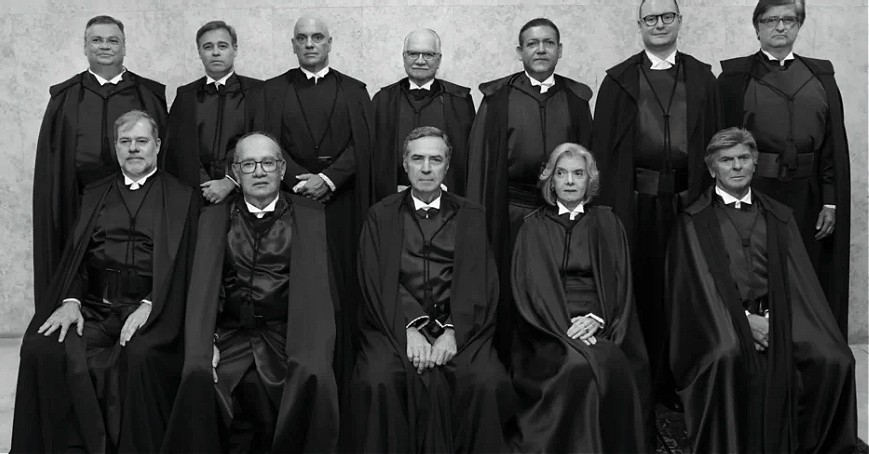Justice in Brazil: A System of Contradictions?
Justice in Brazil: A System of Contradictions? In a perplexing display of judicial inconsistency, Brazil’s criminal justice system has once again raised eyebrows. On one hand, three individuals accused of a brutal murder and decapitation have been granted provisional freedom.
NEWS
Everton Faustino
4/14/20253 min read


The contested Brazilian supreme court
In a perplexing display of judicial inconsistency, Brazil’s criminal justice system has once again raised eyebrows. On one hand, three individuals accused of a brutal murder and decapitation have been granted provisional freedom. On the other, Débora Rodrigues, a hairdresser and mother of two, faced a 14-year prison sentence for defacing a statue with lipstick. The stark contrast between these cases underscores a troubling pattern: leniency for violent criminals and harsh penalties for lesser offenses.
A Tale of Two Verdicts
The 2nd Jury Court of Fortaleza ruled that the accused murderers did not pose a threat to public order, despite their ties to the Comando Vermelho, one of Brazil’s most notorious criminal factions. Meanwhile, Débora Rodrigues, who participated in the January 8th protests, was swiftly sentenced to over a decade in prison for her symbolic act of defiance. The Supreme Court later adjusted her sentence to house arrest, but the damage was done—her case became emblematic of judicial excess.
The Double Standard in Brazilian Justice
Brazil’s legal framework theoretically upholds the principle of proportionality, ensuring that punishments fit the severity of crimes. However, these cases suggest otherwise. The release of convicted murderers while political protesters face severe sentences raises concerns about selective enforcement and judicial bias.
Legal experts argue that the politicization of justice has led to disproportionate sentencing, where ideological considerations outweigh legal principles. The case of Débora Rodrigues exemplifies this trend—her punishment was grossly disproportionate compared to violent offenders who walk free.
Felipe Martins: A Case of Document Falsification
Felipe Martins, a former advisor to Jair Bolsonaro, faced allegations of falsifying U.S. entry records. The American justice system took these accusations seriously, treating document falsification as a grave offense with potential penalties of up to 30 years in prison. Despite the severity of the charges, Martins' defense argued that the case was built on "narratives" rather than concrete evidence. This case underscores the stark contrast between how justice systems in different countries approach allegations of fraud.
Lula's Corruption Allegations: A Weak Excuse for Dismissal
In Brazil, the handling of corruption allegations against Lula has been a subject of intense scrutiny. Despite substantial evidence pointing to his involvement in corruption schemes, the charges were dismissed on procedural grounds, with critics labeling the reasoning as "weak excuses". This decision has fueled public outrage and raised questions about the politicization of Brazil's judiciary.
A Tale of Two Systems
The comparison between Felipe Martins and Lula highlights a troubling pattern in Brazil's justice system. While the American judiciary treats document falsification as a serious crime, Brazil's courts have been accused of dismissing corruption charges against powerful figures with little justification. This disparity raises concerns about selective enforcement and judicial bias.
Public Outrage and Calls for Reform
The Brazilian public has reacted with outrage, questioning the integrity of the judiciary. Critics demand a comprehensive review of sentencing guidelines to prevent such glaring disparities. If Brazil’s justice system continues to favor violent criminals while punishing minor offenders, public trust in the judiciary will erode further.
Conclusion
The contrasting fates of Débora Rodrigues and the released murderers highlight a deep flaw in Brazil’s criminal justice system. Until judicial decisions reflect fairness and proportionality, the country will remain trapped in a cycle of legal contradictions—where justice is not blind, but selectively enforced.
Tags: Brazilian Justice, Criminal Sentencing In Brazil, Legal System Contradictions, Débora Rodrigues Case, Felipe Martins Investigation, Lula Corruption Scandal, Selective Justice In Brazil, Judicial Bias, Brazilian Politics, Legal Fairness, Supreme Court Decisions, Comando Vermelho, Crime In Brazil, Legal Reforms, Public Outrage In Brazil.
https://static.poder360.com.br/2025/03/Debora-pede-liberdade.pdf
https://www.jusbrasil.com.br/artigos/erro-grosseiro-na-fixacao-de-pena-de-debora-rodrigues-e-demais-reus-do-8-de-janeiro/3324179698
https://revistaoeste.com/politica/justica-manda-soltar-reus-que-decapitaram-mulher-nao-causam-risco-a-ordem-publica/
https://noticias.stf.jus.br/postsnoticias/relator-concede-prisao-domiciliar-a-debora-dos-santos-re-pelos-atos-de-8-de-janeiro/
https://www.nutshellapp.com/publicsummaries/investigation-into-felipe-martins-allegations-of-fraud-and-political-implications
https://www.cnnbrasil.com.br/politica/defesa-de-filipe-martins-indiciamento-e-fabricado-com-base-em-narrativas/
Type the words below into the Unveiled Brazil search engine to learn more:
STF
JUSTICE
FREEDOM
LIBERTY
